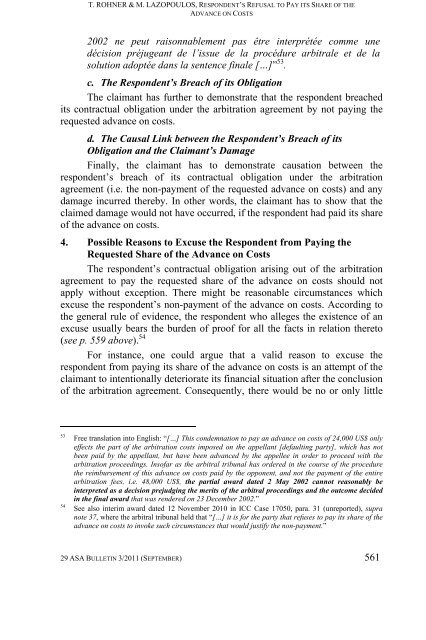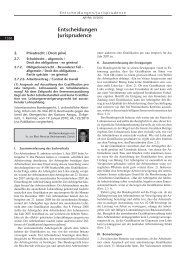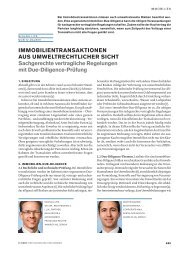ASAB 29-3 Thomas Rohner Michael Lazopoulos - Pestalozzi ...
ASAB 29-3 Thomas Rohner Michael Lazopoulos - Pestalozzi ...
ASAB 29-3 Thomas Rohner Michael Lazopoulos - Pestalozzi ...
You also want an ePaper? Increase the reach of your titles
YUMPU automatically turns print PDFs into web optimized ePapers that Google loves.
T. ROHNER & M. LAZOPOULOS, RESPONDENT’S REFUSAL TO PAY ITS SHARE OF THE<br />
ADVANCE ON COSTS<br />
2002 ne peut raisonnablement pas être interprétée comme une<br />
décision préjugeant de l’issue de la procédure arbitrale et de la<br />
solution adoptée dans la sentence finale […]” 53 .<br />
c. The Respondent’s Breach of its Obligation<br />
The claimant has further to demonstrate that the respondent breached<br />
its contractual obligation under the arbitration agreement by not paying the<br />
requested advance on costs.<br />
d. The Causal Link between the Respondent’s Breach of its<br />
Obligation and the Claimant’s Damage<br />
Finally, the claimant has to demonstrate causation between the<br />
respondent’s breach of its contractual obligation under the arbitration<br />
agreement (i.e. the non-payment of the requested advance on costs) and any<br />
damage incurred thereby. In other words, the claimant has to show that the<br />
claimed damage would not have occurred, if the respondent had paid its share<br />
of the advance on costs.<br />
4. Possible Reasons to Excuse the Respondent from Paying the<br />
Requested Share of the Advance on Costs<br />
The respondent’s contractual obligation arising out of the arbitration<br />
agreement to pay the requested share of the advance on costs should not<br />
apply without exception. There might be reasonable circumstances which<br />
excuse the respondent’s non-payment of the advance on costs. According to<br />
the general rule of evidence, the respondent who alleges the existence of an<br />
excuse usually bears the burden of proof for all the facts in relation thereto<br />
(see p. 559 above). 54<br />
For instance, one could argue that a valid reason to excuse the<br />
respondent from paying its share of the advance on costs is an attempt of the<br />
claimant to intentionally deteriorate its financial situation after the conclusion<br />
of the arbitration agreement. Consequently, there would be no or only little<br />
53<br />
54<br />
Free translation into English: “[…] This condemnation to pay an advance on costs of 24,000 US$ only<br />
effects the part of the arbitration costs imposed on the appellant [defaulting party], which has not<br />
been paid by the appellant, but have been advanced by the appellee in order to proceed with the<br />
arbitration proceedings. Insofar as the arbitral tribunal has ordered in the course of the procedure<br />
the reimbursement of this advance on costs paid by the opponent, and not the payment of the entire<br />
arbitration fees, i.e. 48,000 US$, the partial award dated 2 May 2002 cannot reasonably be<br />
interpreted as a decision prejudging the merits of the arbitral proceedings and the outcome decided<br />
in the final award that was rendered on 23 December 2002.”<br />
See also interim award dated 12 November 2010 in ICC Case 17050, para. 31 (unreported), supra<br />
note 37, where the arbitral tribunal held that “[…] it is for the party that refuses to pay its share of the<br />
advance on costs to invoke such circumstances that would justify the non-payment.”<br />
<strong>29</strong> ASA BULLETIN 3/2011 (SEPTEMBER) 561




